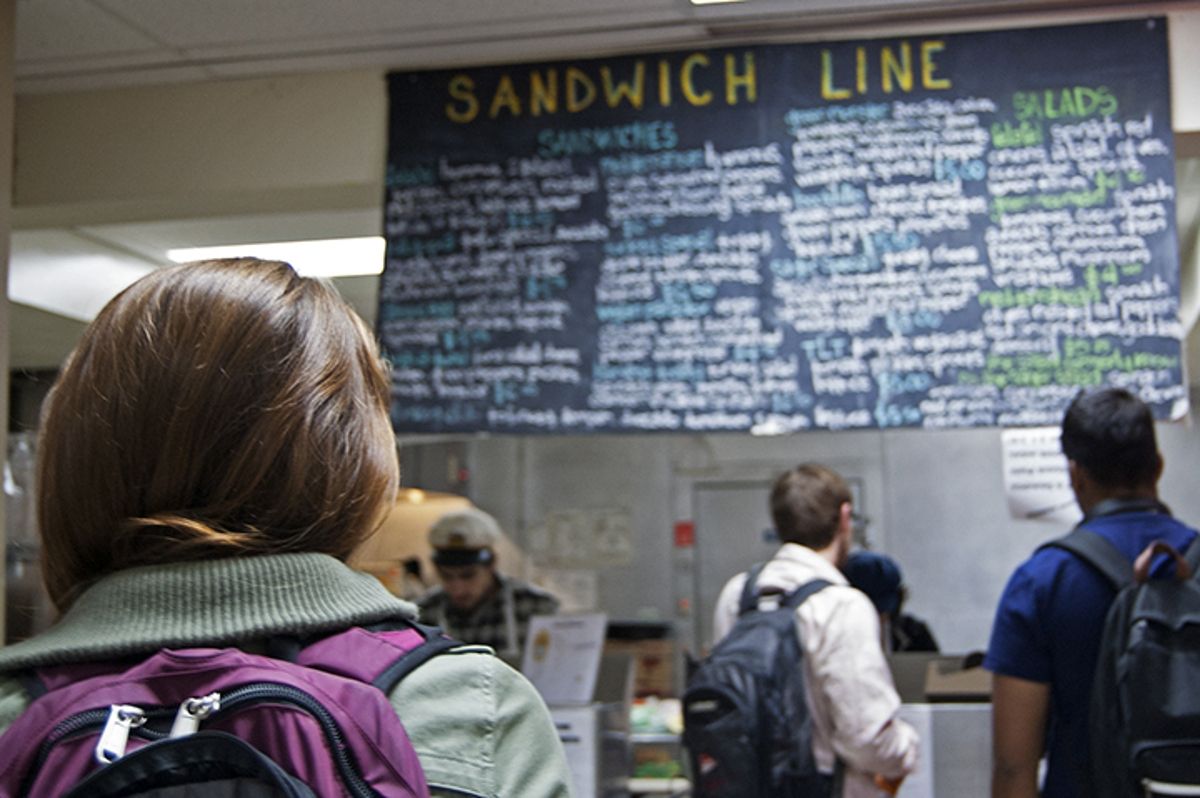The Maryland Food Co-op is calling for students and alumni to refrain from donating to the University of Maryland, in a last-ditch effort to pressure Stamp Student Union to keep the establishment from closing permanently May 31.
The Co-op — a vegan-friendly shop owned by its workers — brought in enough money to pay off its debt to the state, amounting to about $8,500. However, it still owes Stamp about $40,000, not including the amount it owes vendors, according to Stamp director Marsha Guenzler-Stevens.
Last month, Stamp rejected the shop’s plan to pay off their debt, saying it came too late. As of Wednesday evening, over 2,300 people have signed on to refuse donating to this university if the Co-op is shuttered, and to continue the boycott until a student-run cooperative space, on or off-campus, is secured.
Co-op worker Michael Brennan said the boycott isn’t meant to vilify Stamp or the university, but rather to put pressure on the administration to cement a cooperative spot nearby, even if the business is shut down.
“It seems kind of harsh to call for a boycott of the university, but … it’s a tactic to build power in order for a positive outcome to come out of this,” said Brennan, a public policy graduate student. “It’s a way to build power, so that we can make sure that the cooperative’s legacy is preserved on this campus.”
[Read more: Stamp says UMD’s Co-op is closing next month. Its workers still have hope.]
Even in the face of the boycott, Stamp remains firm in its decision to shut down the Co-op by the end of the month, Guenzler-Stevens said.
If the Co-op were able to repay all of its outstanding debt — which it proposed to do in April by paying $2,500 back per month, beginning in September — Guenzler-Stevens said the shop’s flawed financial model would still generate issues. But she added that she does see an eventual possibility for another cooperative to be established, or for the current one to return, at a later date if the financial model is improved.
“I think we continue to hope that the Co-op can honor its past, and think about a future trajectory,” Guenzler-Stevens said.
In other efforts to save the establishment, its workers started a GoFundMe page in March. As of Wednesday night, they had raised over $13,500 toward a $23,500 goal.
About two weeks ago, Brennan said, workers began circulating an open letter to student affairs vice president Linda Clement, asking her to rescind Stamp’s order for the Co-op to vacate its space at the end of the month. So far, 95 faculty members, 88 staff members and 109 graduate students have signed the letter.
The Co-op has a supporter in state Sen. Jim Rosapepe (D-Anne Arundel and Prince George’s), whose district includes this university’s campus. Rosapepe said he has offered up “free advice,” and to put workers in touch with people who could help them put together a sustainable business model.
[Read more: Adele’s replacement delayed several months amid rent, operations negotiations]
“It’s got a big problem in the short-run, and a big opportunity in the long-run,” Rosapepe said.
Rosapepe said he is not involved in the boycott, and takes “no position either way.”
The Student Government Association also passed two bills to help keep the Co-op afloat. The first helped fund a celebration for the collective Friday, and the second one was to support discussions between its workers and the administration.
Even though Tuesday was the last day of the student government’s legislative session, outgoing SGA sustainability director Amelia Avis wants representatives to continue fulfilling the latter bill’s purpose by reaching out to contacts throughout the university.
“If they signed this bill and they’re not doing anything, then it’s all fake,” said Avis, a senior government and politics major. “I’m seeing inaction after they’ve promised action, and that’s why people don’t trust the SGA on this campus.”
Ultimately, Brennan said he hopes the boycott will mobilize the campus community to save the collective — a place he’s worked at since August 2018, and for which he said he will continue to fight for, even after graduating next year.
“Fundamentally, the way to move forward with the university is not to pay off the debt to them,” Brennan said. “It’s to make the argument that we are viable and that our community believes we’re viable.”



